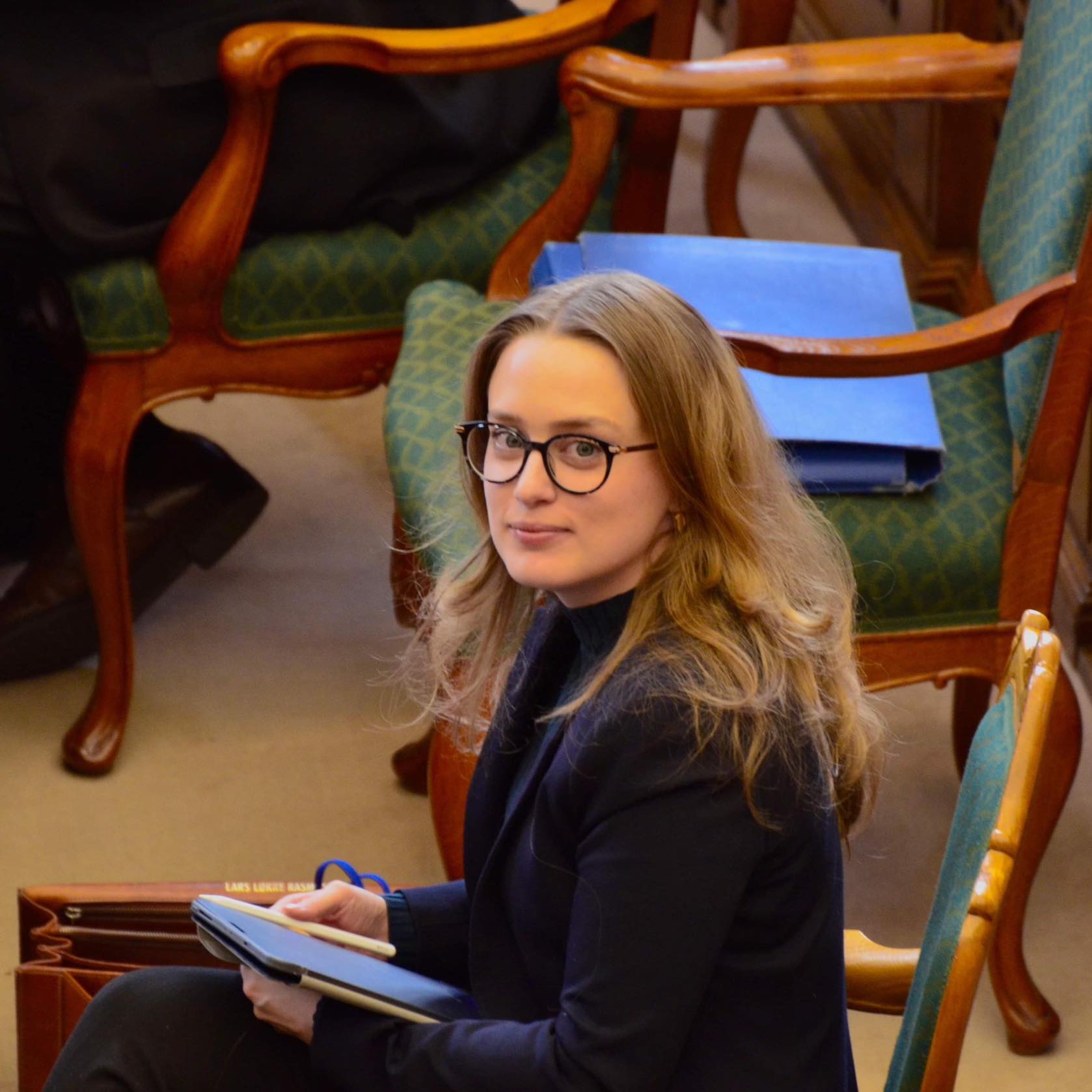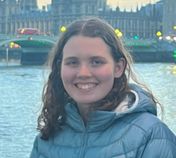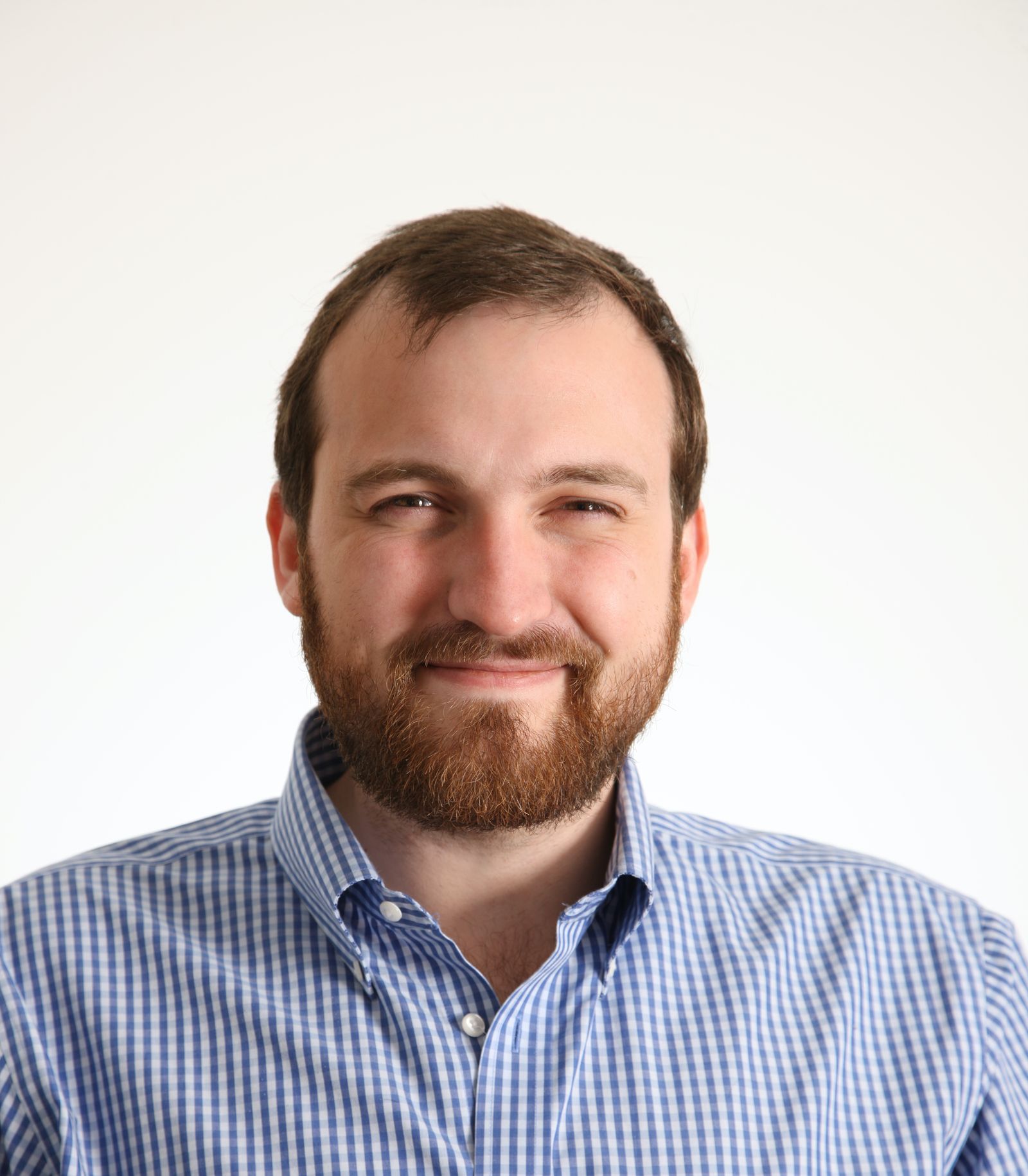Aki-Matilda Høegh-Dam is a Danish-Greenlandic politician representing the Greenlandic Siumut party. She was elected to the Danish parliament, the Folketing, in the 2019 Danish general election at the age of 22, making her the youngest member of parliament at that time.
As the youngest member of the Folketing when you were initially elected, how has your age influenced your political perspective and approach in parliament?
It's a difficult thing to say, right? Because I don't know what it means to be a younger or older member of parliament per se. It's difficult for me to say; I haven't experienced being older. But in general, I would say, of course age, background, and gender influence the kind of policies we make. It’s all about how we view the world, which is shaped by our backgrounds. So, I would say, of course it matters, but not more or less than it would for anyone else. Being older also has an influence, I guess.
In May 2023, you refused to speak Danish in a parliamentary debate. What is the significance of delivering your speech in Greenlandic?
First of all, the thought of speaking Greenlandic in the Danish Parliament had crossed my mind a few times before I actually did it. Let me give some background information. I grew up in Greenland my whole life. Greenland was recognized by the United Nations in 2009 as a country with its own people, language, and culture. Even today, we are still living in a post-colonial context where we are often told we won't accomplish anything if we aren't Danish enough—if we don't speak proper Danish or look Danish enough. Growing up with this mindset and coming from a mixed Danish-Greenlandic family, it was clear to me that my Danish family was treated better than my Greenlandic family solely because of their background.
In the Danish parliament, we have a structure that acknowledges Greenlandic as the official language of Greenland. However, every time we get elected to the Danish parliament, we are told we shouldn't even run for politics if we aren't Danish enough or don’t speak proper Danish. This means a significant percentage of the Greenlandic population doesn't understand what is happening in the Danish parliament concerning their own country. My speech was a response to these feelings of inadequacy and the condescending attitude towards Greenlandic people. It was both a protest against the system and an effort to ensure that the majority of Greenlandic people, who don't speak Danish fluently, have the opportunity to understand the policies being made.
How do you respond to criticism that speaking Greenlandic in the Danish parliament is unproductive or divisive?
I would say it’s a reaction to what is already unproductive and divisive. If we want to avoid division, we need to ensure that the majority of Greenlandic people can participate in the democratic processes in the Danish parliament. If it were truly unproductive, why was there such a strong reaction to it? I would say, I ended up making more of a change than [in] my first term in 2019, when I tried to address these issues without causing a fuss. They didn't listen back then, but this speech made people aware of how we feel in Greenland every day. For ten minutes, they experienced a fraction of what we go through daily, and they couldn't handle it.
Beyond neo-colonial attitudes, what are the main issues you and others seek to address regarding relations between Denmark and Greenland, particularly in light of historical misconduct by Danish authorities such as the involuntary fitting of intrauterine devices?
I think it's important to acknowledge that if we do believe in democracy, stuff like this will come up eventually, and I think it's important to discuss it, be open-minded about it, and keep pace, instead of trying to close it down as fast as possible, because we've seen that people end up having intergenerational trauma. If we don't have room and time to process atrocities, such as the one mentioned, we're not going to get over it. We're just going to live on with it even further.
But, in terms of the political future between Greenland and Denmark: despite people trying to [paint] me as very radical, I would say I consider myself to be more of a realist. I think it's important to look at our populations and always try to fight even for those who did not vote for us, so we have to think about that. There are a lot of Danish people who moved to Greenland, who have children with Greenlandic people. We have a lot of Greenlandic people who live in Denmark. I think, when we do fight for independence, as we do, we should also always keep those people in mind. I mean, make sure that we can [produce] the best possible outcome for every one of those people that are involved. We have a lot of familiar background with each other.
I do believe, in a sense, through Greenlandic independence, the ties and the familiar bonds with Denmark might actually become stronger, [unlike] what people think. People are very worried that the independence movement, this “separatism” as they call [it], will just divide us even further. I believe the opposite. Because at this moment, the system that we're in is [unequal] and will never be equal, in my opinion, with my experiences. [It will never be equal] unless we become an independent state in which we can actually have an equal discussion [at the] table, with politicians from both sides, where we're [not] in the “other.” That’s the only way we can actually move forward as equal partners in a more globalized world.
Since Greenland was granted broad self-governing autonomy in 2009, how has this autonomy affected the day-to-day lives of Greenlandic people, and how does the legacy of Danish governance persist?
We've changed the rhetoric. We still call it independence in English, but the rhetoric has shifted from independence to state creation. The UN Charter talks about statehood rather than independent countries. Right now, Greenland is a country, the Faroe Islands is a country, and Denmark is the only state. Greenland is under the state of Denmark. We're advocating for state development.
We believe that the word “independence” doesn't fit our globalized world anymore. The only truly independent country might be North Korea, and even it is dependent on China. The word “independence” isn't suitable for a world where we are all interconnected and dependent on each other. However, we want to create a state in which Greenland has authority over, for example, foreign policy, which we would never have if we weren't a state.
I do believe we need state development because we've tried to improve things under the current structure within the Danish kingdom, and it's more difficult than we wanted it to be. There are benefits to small countries coming together and helping each other. The problem with the current Kingdom of Denmark is that the countries within it are not equal, and Denmark always has a veto on many issues.
We believe that combining the benefits of the Kingdom of Denmark with the benefits of statehood would result in something more like a commonwealth. This would be similar to a free association commonwealth, where Greenland is a state, the Faroe Islands is a state, and Denmark is a state, but we work together as a larger entity. We might even still have the crown involved, with King Frederik X now instead of the Queen [Margrethe II, who abdicated in January 2024].
I believe that independence or statehood would be a tool for creating better opportunities and lives for the population of Greenland. However, it still needs a lot of work. Independence alone won't solve everything, but having the tools that come with statehood is essential for improving the lives of our population.
How do you believe the key elements of Greenland’s first draft constitution reflect many of these obstacles and aspirations?
The draft constitution is like the term, just a draft. At this moment, I do believe there are still going to be a lot of changes to it. The Greenlandic parliament talked about it recently, about a month ago or so. When they discussed it, they actually went a bit away from it and started talking about activating what is called Paragraph 21 in the Self-Government Act. Paragraph 21 states that when the Greenlandic population decides, they will activate the independence process, which they have done recently. So, the Danes of the Greenlandic parliament have actually voted for the activation of Paragraph 21, which is the activation of trying to become a state. With that, this fall, the Greenlandic government will present what [it] should do in order to have negotiations with the Danish government in terms of [what] Greenlandic statehood might look like, and to discuss the Constitution. But as it is right now, it's not going to have such an impact per se, because [the Constitution is] still going to have a lot of changes as we look at it from our point of view.
What role do you see for international organizations and other countries in supporting Greenland’s potential journey toward independence, if any?
It's not a topic I have discussed directly with others. I'm also a member of the NATO [Parliamentary Assembly]. When we travel around the world, we discuss these issues. I do believe it's very important that the Danish government is on our side. If the Danish government can see the potential for Greenlandic independence as a win-win for both Greenland and Denmark, this process of other countries [aligning] with our views will be much easier than if Denmark weren't agreeing with us.
To be honest, a lot of countries around the world are themselves colonizing countries. Many of them might be intimidated by a country such as ours, which is a self-governing autonomous region, gaining independence without the support of our former colonizer. What would that mean for other countries that also have self-governing territories? I think a lot of the politicians I talk to, especially [the] ministers and prime ministers [of these countries], would have that in mind. They would think, "What would happen to our self-governing autonomous countries?"
But I believe that Greenland will still fight and advocate for our right to independence, no matter what the Danish people say. The process would be a lot easier for both Denmark and Greenland if Denmark were aligned with these views. If you look at the UN Charter and the rights for self-determination, we [secured those rights] back in 2009 because the Greenlandic population was acknowledged as a people for themselves, not [just] Danish. Every recognized people [has] the right to external self-determination. Now, we have only internal self-determination. The right for external self-determination is already in the UN Charter, which is very important in this context.
No matter what, it's going to be a lot of work. We’re going to have to convince a lot of countries. I believe a lot of countries would be easy to talk to, but some former colonizing countries would take a bit more convincing.
What message would you have for young Greenlandic people who aspire to enter politics or advocate for their community?
That's a tough one. We all have our individual stories and experiences with it. And, of course, it depends a lot on exactly what kind of politics you're looking for, whether it's more municipal politics or governmental politics. When we talk to young people, we often hear a sense of self-doubt, right? “I’m not experienced enough” or “I don't know if I can talk to these people; they've been politicians for so long.” And, I think it's all about mindset, in a way.
What helped me was thinking, “If it works out, great. If it doesn’t work out, it’s all going to work out in the end.” So either way, even if you mess it all up, it's going to be fine. It’s going to work itself out eventually. I think we are our own biggest [enemies] because we doubt ourselves so much. But if we don't, we have so many possibilities to show our elders how it’s done. I think we should just prove to the older generation that we're going to do things they were never able to do.
Black spoke with Høegh-Dam on June 11th, 2024. This interview has been lightly edited for length and clarity.





